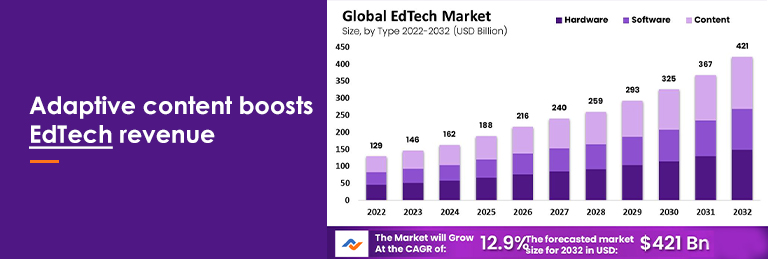How Much Does Website Development Cost in the USA in 2026?
How Much Does Website Development Cost in the USA in 2026? In the hyper-competitive digital landscape of 2026, a robust,…
According to Statista, the EdTech market is expected to reach a stunning $18.66 billion by 2027, indicating that this sector’s growth is not slowing. This dramatic rise prompts the question,
Certain characteristics have come to define the triumph of EdTech firms amidst the rapid expansion of online learning platforms, mobile apps, and virtual classrooms. For starters, personalisation has taken precedence. The capacity to adjust instructional content to various learning styles encourages participation and improves learning outcomes. As a result, EdTech companies with platforms that combine adaptive algorithms and data analytics have a competitive advantage.
Furthermore, accessibility is an important consideration. The internet’s worldwide reach has allowed EdTech to transcend geographical boundaries, making quality education accessible to remote and neglected locations. This inclusiveness not only solves educational disparities, but it also broadens the potential consumer base for EdTech enterprises.
Over the years, the EdTech app business models – both educational apps for kids and organisational learning – have emerged as one of the most profitable (for inventors) and appealing (for investors) business models. It is one of the few industries that can survive the COVID-19 epidemic and continue to develop.
If you have a lot of Edtech startup ideas or even education startup ideas, that’s excellent, but they must be tackled methodically. Anyone looking for an education app development company, or even freelance educational app developers, must first categorise their education startup business strategy.

EdTech firms address real-world educational difficulties while incorporating cutting-edge technology to improve the learning experience.

Service models used by EdTech companies vary, including subscription-based access, pay-per-course alternatives, corporate training alliances, and marketplace platforms. In the digital age, these variants provide to personalised learning, skill development, and flexible educational options.
Here’s a table outlining different service model variations for an EdTech business:
| Service Model | Description | Examples |
| Subscription | Users pay a recurring fee for access to premium content, personalized learning, and advanced features. | Coursera, LinkedIn Learning, Skillshare |
| Freemium | Basic content is available for free, with premium features unlocked through a paid subscription. | Duolingo, Kahoot!, Quizlet |
| Pay-per-Course | Users pay for individual courses or modules, allowing flexibility and choice in their learning. | Udemy, MasterClass, Khan Academy (Udemy) |
| Corporate Solutions | Offering tailor-made packages to businesses and organizations for employee training and development. | Pluralsight, Udacity for Enterprise, Coursera for Business |
| Marketplace | Providing a platform for educators to create and sell their courses, sharing revenue with the platform. | Teachable, Thinkific, Udemy (Instructor) |
| Hybrid | Combining multiple service models, such as subscription with pay-per-course options. | edX (offers free courses with paid certificates) |
| Tutoring Services | Offering one-on-one or group tutoring sessions for personalized learning and academic support. | Chegg, WizIQ, Varsity Tutors |
| Test Prep | Focusing on test preparation materials, including practice exams, study guides, and question banks. | Magoosh, PrepScholar, Princeton Review |
| Language Learning | Specializing in language acquisition through interactive lessons, exercises, and cultural insights. | Babbel, Rosetta Stone, Memrise |
| Professional Skills | Providing training in specialized skills like coding, digital marketing, and project management. | Codecademy, LinkedIn Learning (for business skills) |
As per the Education Data Initiative, schools in the US spend an average of $12,624 per pupil, which is the fifth-highest amount per pupil among the 37 other developed nations in the Organization for Economic Co-operation and Development (OECD). According to reports by Reach Capital’s analysis of data from Pitchbook, during the the first six months of 2021, U.S.-based education technology companies raised over $3.2 billion in investment capital.

Ndimension Labs is critical in developing lucrative EdTech enterprises. The company converts educational concepts into profitable ventures through its expertise in building revenue-generating features, scalable platforms, personalised learning algorithms, and smart monetization tactics.
Ndimension Labs contributes significantly to building a profitable EdTech business.
Tailored Platform Development:
Ndimension Labs creates customized, user-centric platforms that offer engaging and personalized learning experiences, driving user retention and monetization.
Effective Monetization Strategies:
By devising subscription models, freemium offerings, and pay-per-course options, Ndimension Labs maximizes revenue generation while catering to diverse user preferences.
Advanced Technology Integration:
Leveraging AI and interactive features, Ndimension Labs enhances the educational content, attracting users and setting the foundation for premium offerings.
Scalable Infrastructure:
Ndimension Labs designs scalable solutions to accommodate growth, ensuring seamless performance as the user base expands, without compromising quality.
Data-Driven Insights:
Utilizing analytics and data tracking tools, Ndimension Labs helps refine content and strategies, optimizing user engagement, satisfaction, and ultimately, profitability.
By leveraging advanced technology and business insights, Ndimension Labs assists in creating sustainable and prosperous EdTech enterprises.

How Much Does Website Development Cost in the USA in 2026? In the hyper-competitive digital landscape of 2026, a robust,…

As a technology consultant, one of the most frequent questions I get from business owners and startup founders isn't "What's…

I remember standing by the window of our Kolkata office on a rainy Tuesday in early January 2025. The city…